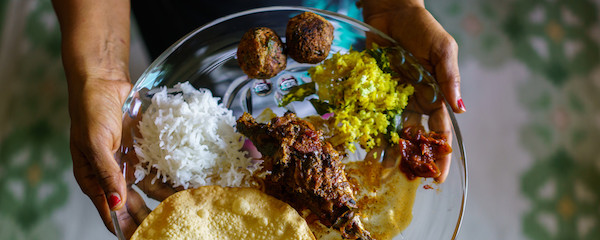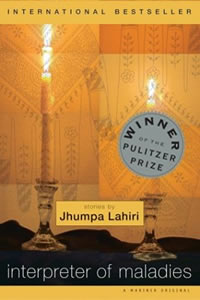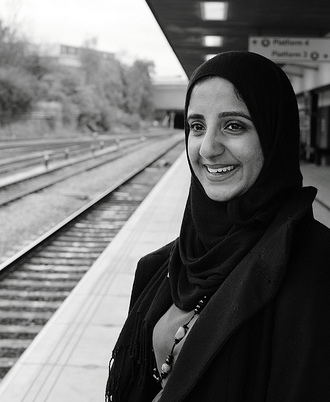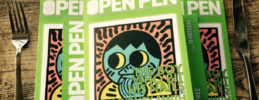
('Mum's Food' © Premshree Pillai, 2017)
FOOD IN EXILE IN JHUMPA LAHIRI’S INTERPRETER OF MALADIES
by FARHANA SHAIKH
I first read Jhumpa Lahiri’s debut collection, Interpreter of Maladies, eighteen months ago, sitting on the beach in Bodrum, sipping a cocktail. I was filled with an instant regret for not having sought out the collection sooner, for the book had been left abandoned on my bookshelf for about half a decade, much like a once-used jar of ground nutmeg.
Published nearly twenty years ago, Interpreter of Maladies won the Pulitzer Prize 2000, and propelled Lahiri’s writing career to literary stardom. My edition begins with four pages of praise for the ‘uncommon elegance and poise’ of the nine stories contained herein, which open a small window to the world of Indian Americans and American life.
Born in London in 1967, Lahiri moved to the US as a child and grew up in Rhode Island. She studied at college in New York and moved to Boston after graduation. I wonder if it is this outsider’s gaze and detachment, of drifting between cultures, which enables Lahiri to see things with clarity, fresh eyes and perspective. In an early interview with Charlie Rose, Lahiri explains that writing short stories was her way of ‘attempting to weave those two worlds I grew up in together in some combination that was orderly on the page, in a way that it isn’t always in life.’
Much like Mrs Das’s fascination with the interpreter in the title story, the commonplace can seem extraordinary to an outsider. Lahiri’s neat and carefully drawn observations about living in exile are made without passing judgement. As a critic writing for the Boston Phoenix wrote at the time of publication, in 1999: ‘These stories are at once subtle and informative, filling cultural gaps with the invisible ease granted only to writers of foreign heritage and exceptional skill.’
 While none of the stories are auto-biographical, they are tidy examples of drawing from life, of writing what you know. Lahiri chose to write about the lives of people who are somewhere in between, because such is life when you grow up in two cultures, neither of which you can call your own. This reminds me of the opening lines of Imtiaz Dharker’s poem, ‘Minority’: ‘I was born a foreigner / I carried on from there / to become a foreigner everywhere.’
While none of the stories are auto-biographical, they are tidy examples of drawing from life, of writing what you know. Lahiri chose to write about the lives of people who are somewhere in between, because such is life when you grow up in two cultures, neither of which you can call your own. This reminds me of the opening lines of Imtiaz Dharker’s poem, ‘Minority’: ‘I was born a foreigner / I carried on from there / to become a foreigner everywhere.’
When I first started writing in the early noughties I steered away from what I knew, for fear that my own concerns were not the sort of thing that found their way into the pages of a book. I wonder now, if I had read this collection sooner, whether I might have ended up a different sort of writer.
By the time I pick up the collection again, I am home and it is snowing. The Beast from the East has outstayed its welcome like an unannounced dinner guest, and I am stuck in bed with flu. As I watch the snow fall like desiccated coconut sprinkled on just-baked macaroons, I am yearning for my ‘homeland’ and my mother’s chicken soup. I pull the duvet over me, refusing to leave my bed, at least until the cough subsides. A leaflet, promising tours across Turkey, to Ephesus and Pamukkale, serves as a bookmark, and reminds me of warmer climes and better times. Perhaps it is because I have lost my senses and I am weak that I begin to appreciate the stories on a different level than I did on a first reading. Although I am still full of praise for the simple, everyday language, and the careful restraint in which Lahiri paints the lives of her characters who are at crossroads, it is the theme of food that runs through the stories like a delicate sauce that I begin to take particular delight in. While I’m not exactly nil-by-mouth, I have lost my appetite and my desire to cook, and the collection becomes a comforter and electric blanket all in one, a perfect balm for my malady. In Lahiri’s Interpreter of Maladies food is more than just sustenance, it is purpose, priority and preoccupation.
In the opening story, ‘A Temporary Matter’, a couple who have fallen out of love are plunged into darkness every day, for a week, when the power cuts out at 8pm. The kitchen becomes a safe haven, a place to eat and reconnect, and reveal themselves in a new light. Stay-at-home husband Shukumar cooks the evening meal before his wife, Shoba, returns from work. We learn that Shoba has stopped cooking since the stillborn birth of their first child, and Lahiri signals that Shoba has departed too, she is no longer herself. Food is used to indicate happier times and times of abundance, when Shoba was pregnant, as well as scarcity and abandonment now she is not:
When she used to do the shopping, the pantry was always stocked with extra bottles and corn oil, depending on whether they were cooking Italian or Indian. There were endless boxes of pasta in all shapes and colors, zippered sacks of basmati rice, whole sides of lamb and goats from the Muslim butchers at Haymarket, chopped and frozen in endless bags.
The process of cooking for Shukumar, who uses his wife’s cookbooks and follows her pencilled instructions, is one of more than just providing a meal. It is a form of therapy and escape. Cooking makes him feel productive, but also enables Shukumar to show his commitment to his marriage, of not giving up on his wife. Ultimately, it is an act of love, for he realised that, ‘If it weren’t for him, he knew Shoba would eat a bowl of cereal for her dinner.’
Now that I am no longer spending hours cooking myself, I begin to realise that so much of my own life revolves around the kitchen – even my desk sits in one corner of the room. It is often the only space where I find myself being able to navigate with confidence and show any semblance of discipline. When my husband comes home from work one night with shop-bought naan, which he eats with leftovers, I confess to him that I would happily go to bed eating tinned custard and Weetabix. Now I am infirm, I also become acutely aware that food is not only a basic necessity, but a source of healing. I drink copious amounts of hot water, with slices of lemon and teaspoons of honey, while my friends over on Whatsapp suggest all manner of concoctions to rid me of my cough, from turmeric to ginger. I begin to feel like Bibi Haldar who, in ‘The Treatment of Bibi Haldar’, ‘had been prescribed to shun garlic, consume disproportionate quantities of bitters, meditate, drink green coconut water, and swallow raw duck’s eggs beaten in milk.’
I find myself at home in ‘When Mr Pirzada Came to Dine’. Here, Lahiri reflects the wonderful spirit of Indian hospitality, and shows how inviting someone to share a meal is considered an extension of community and brotherhood. Mr Pirzada is not a normal dinner guest; he is all but a stranger, found by the parents of ten-year-old protagonist, Lilia, through the university directory. Nor does he only dine with the family once, as the title of the story may suggest, but over a period during the Pakistani civil war. Eating together becomes a way of sharing news of the war, and providing comfort to Mr Pirzada who has a wife and seven daughters at home in East Pakistan. As a show of thanks, Mr Pirzada gifts sweets to Lilia, which she stores like treasures.
The theme of food is also used to reflect the difficult transition Lahiri’s characters are making, as well as highlight the commonalities and differences between the two cultures and people:
The supermarket did not carry mustard oil, doctors did not make house calls, neighbours never dropped by without invitation, and of these things, every so often, my parents complained.
When Lilia’s father insists that Mr Pirzada is different, no longer Indian due to Partition, she observes their eating habits:
It made no sense to me […] They ate pickled mangoes with their meals, ate rice every night for supper with their hands. Like my parents, Mr Pirzada took off his shoes before entering a room, chewed fennel seeds after meals as a digestive, drank no alcohol, for dessert dipped austere biscuits into successive cups of tea.
It’s rare for me to see my own concerns and experience of differing cultures reflected back this way. These observations may be made through a child, but they are very much an echo of lived experience, of the confusion one feels when they are told they don’t belong. I have often wondered who decides that we must define ourselves in neat little boxes, when in reality, there is so little that separates us.
 In ‘Sexy’, Laxmi scoffs Hot Mix nonchalantly while sitting at her desk in the fundraising department, offering her cousin marital advice over the phone. Meanwhile, her western colleague, Miranda, only observes the fall out. Miranda is involved in an affair of her own with an Indian man, Dev, and while she has no understanding of the culture, or the language, food offers her a way of navigating the tricky space in which she finds herself. One day ‘she walked all the way to Central Square, to an Indian restaurant, and ordered a plate of tandoori chicken. As she ate she tried to memorize phrases printed at the bottom of the menu.’
In ‘Sexy’, Laxmi scoffs Hot Mix nonchalantly while sitting at her desk in the fundraising department, offering her cousin marital advice over the phone. Meanwhile, her western colleague, Miranda, only observes the fall out. Miranda is involved in an affair of her own with an Indian man, Dev, and while she has no understanding of the culture, or the language, food offers her a way of navigating the tricky space in which she finds herself. One day ‘she walked all the way to Central Square, to an Indian restaurant, and ordered a plate of tandoori chicken. As she ate she tried to memorize phrases printed at the bottom of the menu.’
In a similar vein, in ‘The Third and Final Continent’ the male protagonist relates his story of moving from India to America. Cornflakes, the first meal that he eats, becomes symbolic for adopting a new way of life and a new routine. ‘In a week I had adjusted, more or less. I ate cornflakes and milk morning and night, and bought some bananas for variety, slicing them into the bowl with the edge of my spoon.’
But not all of Lahiri’s characters enjoy a smooth transition. In my favourite story in the collection, ‘Mrs Sen’s’, Lahiri’s protagonist is a young homesick housewife who cannot drive. While her husband works all hours at the university, Mrs Sen’s only solace comes from visiting the market to buy fresh fish and reading letters from her family. Moreover, the only time Mrs Sen appears in control and in command of her own life is when she is chopping or slicing:
…she took whole vegetables between her hands and hacked them apart: cauliflower, cabbage, butternut squash. She split things in half, then quarters, speedily producing florets, cubes, slices and shreds. She could peel a potato in seconds.
There is something mesmerising in Lahiri’s description, magical almost: ‘One by one she drew them from the paper wrapping, wrinkled and tinged with blood. She stroked the tails, prodded the bellies, pried apart the gutted flesh.’ We learn about Mrs Sen’s yearning for home and her isolation through her unlikely friendship with Eliot, a boy she looks after for an hour or so, after school. In his company, she talks through recipes, and her upset: ‘Here, in this place where Mr Sen has brought me, I cannot sometimes sleep in so much silence.’
Throughout Interpreter of Maladies, Lahiri shows how important food is to those living in exile. It offers them purpose and preoccupation. More than just a mundane act, cooking is a process of preserving memories, of finding a way home, and of self-discovery.
It is no coincidence that in the days following my close reading of this collection, I feel deeply emotional. Lahiri’s vivid description of food and home have left me with a deep sense of longing. Part of me is desperate to get out of bed and write, and the other just wants to sit in bed and cry. I do neither. Instead, I head into the kitchen, and like Mrs Sen, I begin chopping.
~
 Farhana Shaikh is a writer and publisher born in Leicester. She edits The Asian Writer and runs the small press, Dahlia Publishing. Farhana hosts the popular Writers Meet Up Leicester as well as Leicester Writes Festival. In 2017, she won Travelex & Penguin’s The Next Great Travel Writer competition and is currently part of Curve’s Cultural Leadership programme. She was longlisted for the Spread the Word Life Writing Prize 2018.
Farhana Shaikh is a writer and publisher born in Leicester. She edits The Asian Writer and runs the small press, Dahlia Publishing. Farhana hosts the popular Writers Meet Up Leicester as well as Leicester Writes Festival. In 2017, she won Travelex & Penguin’s The Next Great Travel Writer competition and is currently part of Curve’s Cultural Leadership programme. She was longlisted for the Spread the Word Life Writing Prize 2018.

